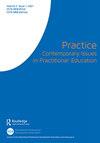Factors for enabling effective student learning within English colleges: the case of computing
Q2 Social Sciences
引用次数: 0
Abstract
ABSTRACT The development of computing as a subject area and the skills gaps present in society has placed an increased emphasis on the teaching of computing and what practices enable effective student learning. Within England, colleges have been described as pivotal in addressing these skills gaps, but there is a lack of computing education research within a college setting. This paper therefore aims to answer the following research question: How are computing educators within English colleges enabling effective student learning for computing? Through conducting 24 semi-structured interviews with computing educators from 13 English colleges, six themes were identified which include having staff who care, building a positive relationship with students, developing student soft skills, challenging current practice, putting an emphasis on students, and other teaching tips. This paper augments findings of good practice that have been found in other educational settings such as the use of unplugged activities, flipped learning, and pair programming, but in the unique context of teaching computing within English colleges. Furthermore, this paper more explicitly contributes to knowledge and practice through detailing how a focus on student needs is deemed more important for enabling effective student learning for computing than the choice of curriculum or available resources.英语院校学生有效学习的因素:以计算机为例
本文章由计算机程序翻译,如有差异,请以英文原文为准。
求助全文
约1分钟内获得全文
求助全文

 求助内容:
求助内容: 应助结果提醒方式:
应助结果提醒方式:


